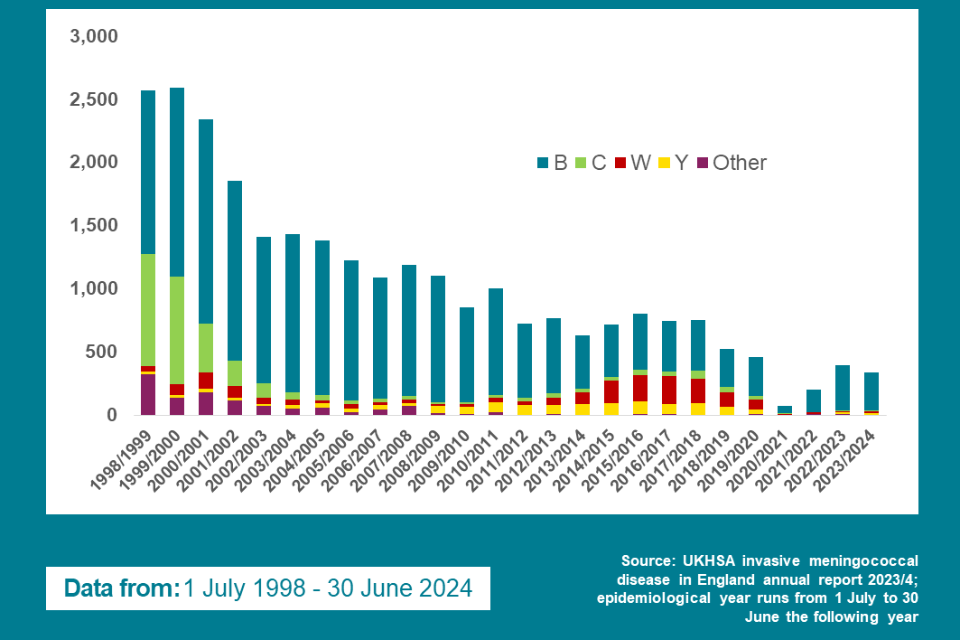UK Health Security Agency
|
|
UK on brink of defeating meningococcal C
The fight against meningococcal B continues.
New UKHSA data shows that cases of meningococcal disease, which typically causes meningitis and septicaemia, continue to decline due to the success of the NHS vaccination programmes over the past two decades.
The UK is now close to defeating meningococcal group C (MenC) disease, with cases down by 99% since an NHS routine vaccination programme was introduced by UKHSA and NHS England in 1999 - with just three cases reported last year (July 2023 to June 2024).
Other groups of meningococcal disease, including A, W and Y remain very low, but health experts remain concerned about meningococcal Group B (MenB) due to a slow continued decline in the uptake of childhood vaccinations, including the MenB vaccine, which is given to babies as part of the NHS Childhood Vaccination Programme.
This data shows a total of 341 cases of meningococcal disease were confirmed last year with MenB responsible for 88% (301) of all cases in England.
Confirmed cases of invasive meningococcal disease in England, by epidemiological year and serogroup

Dr Shamez Ladhani, Consultant Epidemiologist at UKHSA, said:
Thanks to the power of vaccines, we are now on the brink of defeating meningococcal C disease in the UK, but the fight against these deadly diseases that cause meningitis and septicaemia continues with meningococcal B still causing most of the 341 cases last year.
That’s why it is so important that parents protect their children by ensuring they get their infant MenB vaccinations and teenagers get their MenACWY in school.
Infants are vaccinated against MenB and MenC disease as part of the routine NHS Childhood Programme and the MenACWY vaccine for teenagers, in year 9 and 10 (aged 13 to 14), not only protects them against the major causes of meningitis and septicaemia but also helps provide indirect protection among the wider population.
In 2022-23, 91% of children in England received 2 doses of the MenB vaccine, a decrease of 0.5% from the previous year; while the MenB booster coverage was 87.6%, a decrease of 0.4% from 2021-22.
Vaccination rates for young people routinely offered MenACWY vaccine in the 2022-23 school year (end August 2023) was 68.6% in Year 9 and 73.4% by Year 10.
Dr Ladhani added:
All teenagers remain eligible for the MenACWY jab until their 25th birthday. If they have missed out, it is vital they get vaccinated, particularly if they are going on to university or colleges where their risk of severe disease, and sadly even death, from meningitis or septicaemia is much higher.
A multi-media marketing campaign launched earlier this year across England to remind parents and carers of the risk of their children missing out on protection against serious diseases that are re-emerging in the country – with an urgent call to action to catch up on missed vaccinations. If children are not vaccinated, they’re not protected.
Meningitis Now Chief Executive Dr Tom Nutt said:
We welcome the encouraging news of the continued decline of meningococcal disease across England. The positive impact of the UK’s meningitis immunisation programmes cannot be overstated, and we are heartened to see these efforts yielding such powerful results.
The success of the MenC vaccination programme, which was introduced in 1999, has clearly made a profound difference in protecting children, young people, and adults from this life-threatening illness.
While this is a major milestone in the fight against meningococcal disease, we know that there is still work to be done to safeguard every individual, especially those most vulnerable.
MenB remains the most prevalent strain of meningococcal disease. This reinforces the need for continued vigilance, additional research to inform vaccine strategies and support for all families affected by the disease.
Meningitis Now remains committed to ensuring that no one is left behind in the fight against this devastating illness and that progress continues in preventing all forms of meningitis.
Steve Russell, NHS national director for vaccinations and screening, said:
It is fantastic to see the positive impact that continued uptake of meningitis vaccinations has led to over the past decade - they remain our best defence against the highly dangerous disease.
However too many children are still not fully vaccinated and ensuring their protection is as important as ever - this disease can strike quickly and leave you with life-changing health complications if not treated promptly.
Jabs are offered for free as part of the NHS routine immunisation programme which helps prevent tens of thousands of hospital admissions every year and helps save lives, so I advise all parents to speak to their GP practice to check their child’s vaccination records and arrange a vaccination appointment if they are not up to date.
Original article link: https://www.gov.uk/government/news/uk-on-brink-of-defeating-meningococcal-c


